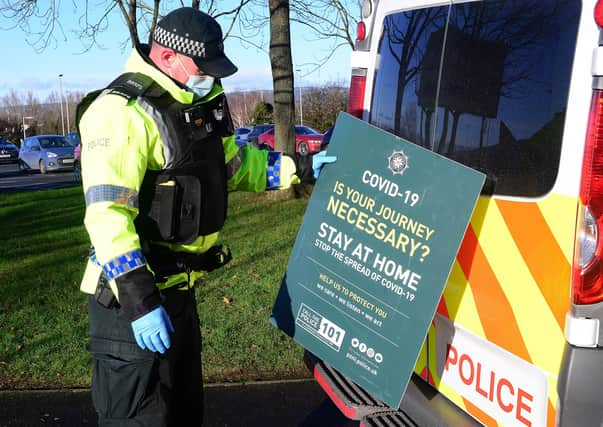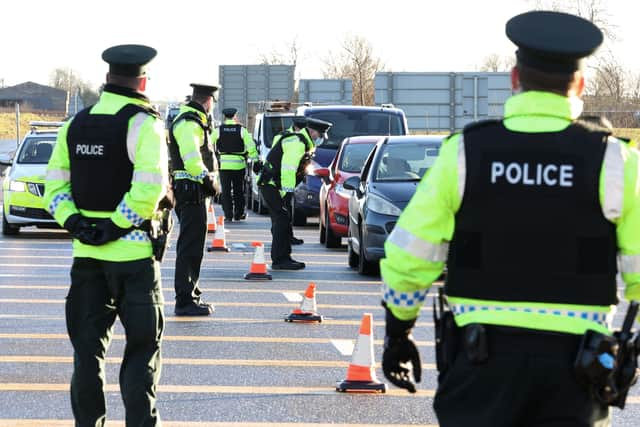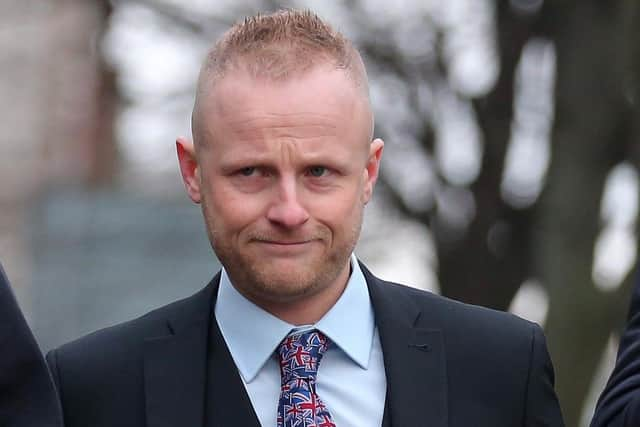Jamie Bryson: Rule of law is being undermined by Stormont’s latest lockdown


The Executive initially purported to outlaw a family of seven, or more, from gathering within the ambit of their own property. The absurdity of that is difficult to comprehend. That any arm of the state would suggest that they may criminalise the act of a family of more than six, from within the one household, gathering within the confines of their own property is chilling.
We then heard from Robin Swann that the legislation would address the confusion within the guidance around outdoor gatherings. It seems no one thought to point out that the purpose of the guidance was to act as an aid to interpreting increasingly complex legislation rushed through without democratic scrutiny, rather than the legislation being required to clarify the guidance.
Advertisement
Hide AdAdvertisement
Hide AdLast week David Allen Green, an expert in public law trained in the drafting of statutory instruments, stated on his blog that he had “given up trying to keep on top of the ever changing increasingly complicated lump of Coronavirus legislation last August”.


The Police Federation Chairman Mark Lindsay then told Stephen Nolan that the PSNI felt there was insufficient precision in some of the regulations, making it difficult to contemplate how the Article 7 requirement for laws to be foreseeable and sufficiently accessible could ever be satisfied.
Mr Lindsay further went on to admit a point which this writer argued on the pages of this paper almost six-months ago- namely that the PSNI have no power of entry in relation to private property in pursuance of enforcing Covid regulations. This admission appeared to go largely unnoticed; it is hard to comprehend how we have arrived at a situation whereby it seems the police have been allegedly unlawfully entering private property for almost a year, and yet that apparent revelation is simply brushed aside.
On Thursday evening the Justice Minister told BBC The View that the Executive believe the Coronavirus Act provided powers of entry for the purposes of investigating house parties. But a cursory glance at Schedule 18 25R (4) demonstrates that those powers of entry do not apply to a private dwelling, save for in circumstances whereby a warrant has been obtained from a judge.
Advertisement
Hide AdAdvertisement
Hide AdThis comes only two weeks after it transpired that all fixed penalty notices under the quarantine regulations were arguably unenforceable due to a lacuna in the legislation which was only (quietly) rectified on 11 December 2020.


All of this feeds into the concerns of many reasonable and fair-minded people that the rule of law, and the long established requirement for the state to demonstrate both necessity and proportionality in relation to interference with the fundamental rights of citizens, is being undermined.
Justice Minister Naomi Long also admitted to the Assembly on Wednesday that the regulations impinge upon fundamental human rights, yet this admission was not followed up with a clear and compelling explanation as to how the Executive had applied the test of necessity and proportionality to each regulation which engages fundamental rights.
There may be an argument that given the public health crisis, and that the ends justify the means. That argument goes that technical breaches of the law or due process should be overlooked in the context of the pandemic. That argument gives rise to two concerning features; firstly, how far is too far? Where precisely is the boundary, and just how much bending of the law or disregard for basic due process is acceptable for the greater good? Secondly, if citizens willingly accede to the notion that fundamental rights, freedoms and basic liberty can be curtailed by decree in times of emergency, then who decides what qualifies as emergency, and what controls are in place to prevent Government by decree becoming an acceptable norm?
Advertisement
Hide AdAdvertisement
Hide AdI fundamentally disagree with the greater good argument. The law is supreme, not the whims of political rulers. It undermines the very principle of the rule of law to suggest that we should overlook technical breaches of it based on the subjective assessment of the political class that the ends justify the means. The law is the law, and it should be applied and due process and long- established principles followed.
In March, I supported lockdown and I supported the police, across the UK, having strong enforcement powers. Within two weeks I changed my mind. It became clear that there were stringent controls on the human exercise of discretionary powers for a reason; some people will naturally be unable to contain the impulse to act arbitrarily.
In England we saw police officers poisoning a beauty spot to encourage visitors to stay away; we witnessed drones sent up to photograph and shame families out walking and we had one police force who even announced that they would be searching shopping trolleys to assess whether only essential items were being purchased.
In Northern Ireland, the PSNI initially purported to decree that ‘exercise started from the front door’, before softening the message to claiming that in fact there was a necessity test as to whether you could travel to exercise. There was never any prohibition on travelling to exercise, nor any necessity test. In an excellent analysis of that situation in this newspaper by Sam McBride he concisely summed it up saying that the PSNI were enforcing laws which did not exist.
Advertisement
Hide AdAdvertisement
Hide AdIn more recent times we seen the debacle of closing carwashes, costing low paid workers and small businesses over two weeks of income in the mouth of Christmas, before then having to accept that in fact perhaps carwashes shouldn’t have been closed at all.
Undeterred by this, they then purported just after Christmas to close taxi depots, before having to very quickly accept that yet again they had got this wrong. And as aforementioned, this week we had the casual acceptance that in fact the PSNI never had any power of entry to pursue enforcement of Covid breaches.
It is not unreasonable to express concern as to the societal damage this is doing, and the dangerous precedents being set. We value a democracy because it’s a system of laws, not rule by decree. Yet democratic accountability and careful law making has been sacrificed in favour of statutory instruments- creating new and ever changing criminal offences- being thrown out like confetti, and the police being given such broad powers that it is inevitable that they will be abused, perhaps as an example of over-zealousness rather than any malicious intent.
If the strategy pursued by the Executive is perpetual lockdown and draconian regulations, then the onus is on them to not only remedy the harm those measures are causing- both in financial and health terms - to the most vulnerable in society, but furthermore to ensure all such measures are in strict compliance with the law, and no more than is necessary and proportionate in a democratic society.